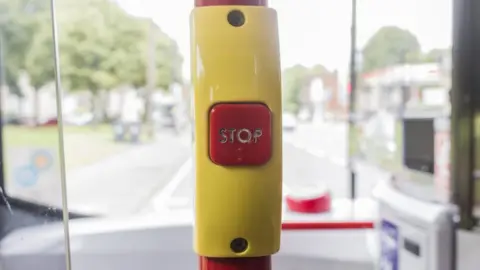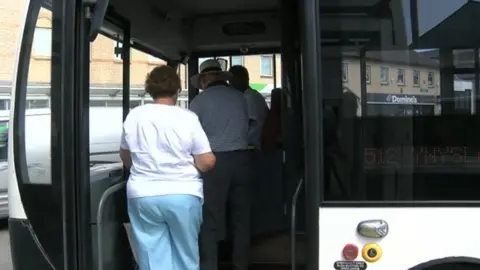Wales' free bus pass age to rise from 60 to state pension age
 Getty Images
Getty ImagesThe age people become eligible for free bus passes in Wales is to rise from 60 to the state pension age, under Welsh Government plans.
Ministers are concerned about the rising cost of the pass, with 880,000 people expected to be eligible by 2021.
Transport Minister Ken Skates confirmed the move, to be introduced gradually, will be included in a proposed new law.
The Older People's Commissioner said she was concerned about the potential impact on the most vulnerable.
Details of when the changes will be introduced remain sketchy. The pass, introduced in 2002, entitles users to free bus travel.
The state pension age for men and women is 65, but will rise to 67 by 2028.
According to a recent consultation, pass-holders represent about 47% of bus journeys in Wales and there were about 730,000 passes in circulation at the end of 2018.
 Getty Images
Getty ImagesBus firms are reimbursed on the basis of an adult single fare, according to a White Paper published last year.
Figures from 2016 showed the cost of providing free bus travel up to that point was in the region of £840m.
The White Paper that put the proposals to consultation said the cost was rising and the Welsh Government needed to "consider ways of managing the rising costs without affecting the eligibility of those persons currently entitled to a concessionary pass".
It said the way reimbursement works was not an incentive for operators to keep fares low.
The consultation proposed introducing the change incrementally and in a way that means anyone who holds a pass at the time of the changes will be unaffected.
The changes will be included in a law, to be considered in the next year, which also includes the introduction of London-style bus franchising.
NUS Wales encouraged ministers to use a share of the savings for free or discounted travel for those in post-16 education, saying for students and apprentices "being able to travel to and from their place of study or work has been a perennial issue, particularly in rural areas".


One bus pass-user was "thrilled" when hers arrived the day before her birthday.
Alison Lewis, 62, from Cimla, Neath Port Talbot, was so keen to get her hands on her bus pass, she started arranging it months ahead of her 60th birthday in 2016.
Despite having a busy day planned, she had to fit in a quick bus trip using her new pass: "I decided I wanted to get on the bus just to celebrate my birthday. In the morning I opened my cards and my pressies and loaded up the car because we were going to Aberdovey afterwards.
"My husband followed the bus in the car and the bus driver said 'What's going on? Your husband is behind in the car'."
She will turn 63 in December and has used it to "pop down to Neath" and the occasional trip to Swansea but "not that much".
Despite enjoying owning a bus pass, she understands the government needs to make savings: "If you've never driven it's a godsend, but lots of people are still working at 60 so wouldn't have that much chance to use it.
"Maybe they should charge everyone [with a bus pass] 50p. I'm happy that I've got it, but I do feel that way."

In Aberystwyth, Lorraine Holland, who has had a bus pass for 13 years, called the plans "terrible".
"Let's affect the pensioners, let's stop them having a bit more pleasure," she said.
Julie Davies described some 60-year-olds as being "on very low wages", adding: "Free buses on a Saturday opens the country to people who wouldn't otherwise travel and opens the economy."
 Getty Images
Getty ImagesIn a statement to AMs, Mr Skates said the bill would "amend the eligibility for the mandatory concessionary fares scheme so that over time it will align with a person's state pension age".
There was support for the decision from Labour AM Alun Davies, who called the move "quite courageous".
"This may not be universally popular but I support it," he tweeted.
"I hope he will use saving to support travel for young people and subsidise social routes."
But Conservative AM Andrew RT Davies suggested the timing of the announcement might have something to do with the current media focus on the change of prime minister.
He said: "Good time to bury bad news? Another Welsh Labour fail - can't remember this being in their manifesto."
Tory business and economy spokesman Russell George warned: "Bus transport for those who are unable to drive can be a lifeline, and with bus routes being cut continuously across Wales, this is another blow to many vulnerable communities."
Older People's Commissioner for Wales Heléna Herklots said although details were limited, she was "concerned the changes could have a significant impact on many older people".
"Many bus services in Wales have been lost in recent years, with many more currently under threat, and a reduction in the number of users on less popular routes, many of whom will be older people, is likely to further exacerbate this," she said.
"More importantly, increasing the eligibility age will undoubtedly affect some of the most vulnerable older people in Wales, such as those living in poverty or near the poverty line, people who have given up work to care for loved ones and those living with long-term health conditions."
Age Cymru said people such as carers, those with disabilities or those from ethnic minorities may find it more difficult to continue working to a state pension age, and would be "less able to cope with a loss of an entitlement such as free bus travel".
A Welsh Government spokesman said: "We remain committed to the principles which have underpinned the scheme in Wales for more than a decade - providing older and disabled people, and more recently some veterans and service personnel - universal access to free bus travel anywhere in Wales on local scheduled bus services."

Analysis by BBC Wales economics correspondent Sarah Dickins
When the popular free bus pass for pensioners aged 60 and over was launched in 2002, a 90-year-old rural resident said to me: "Tell that Rhodri Morgan thank you very much for the bus pass but what I want is a bus."
He was referring to the fact many services had been deemed uneconomic and were abolished.
The policy was introduced after official figures showed just over a quarter of pensioners in Wales were living in poverty and roughly a third of single pensioners.
Pensioner poverty has fallen significantly since then, although it had risen again in recent years. The figures for 2013-16 showed an increase to 18%, but that compares with 23% of people of working age, and 30% of children.
With poverty being concentrated in families with children and with more people working beyond 60, it's easy to see the economic arguments for delaying when free bus travel is given.
However, despite images of pensioners taking off on glamorous cruises, there are still a significant number who need help, and those numbers appear to be growing.
